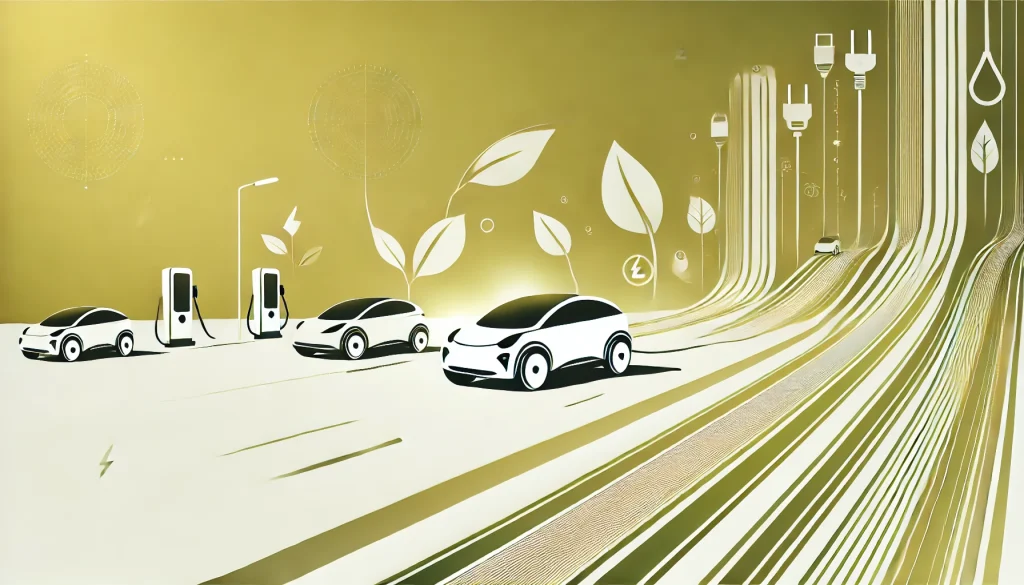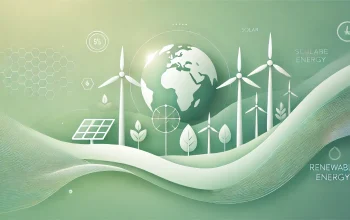Electric Vehicles: The Future Of Driving a Greener EV

As the world confronts the dual challenges of climate change and depleting fossil fuels, electric vehicles (EVs) have emerged as a critical solution for creating cleaner, more sustainable transportation systems. From reducing greenhouse gas emissions to improving air quality in cities, the potential of electric vehicles goes far beyond simply replacing gasoline engines. They are a cornerstone of the global effort to build a greener tomorrow.
In this article, we’ll explore the future of electric vehicles and how they are reshaping transportation. We’ll delve into the latest innovations, the environmental and economic benefits, and the challenges that lie ahead. By the end, you’ll have a clearer understanding of why electric vehicles represent the future of cleaner roads and a more sustainable planet.
The Evolution of Electric Vehicles
Electric vehicles are not a recent innovation. In fact, the first electric cars were developed as early as the 19th century, around the same time gasoline-powered engines were emerging. However, due to limitations in battery technology and the widespread availability of cheap fossil fuels, gasoline-powered cars quickly became the dominant mode of transportation.
Fast forward to the 21st century, and electric vehicles are back in the spotlight, thanks to advances in battery technology, growing concerns about climate change, and government policies promoting green energy. The rise of companies like Tesla, along with established automakers like General Motors and Nissan entering the EV market, has pushed electric vehicles from niche products to mainstream contenders.
Key Milestones in EV Development:
- Early Electric Cars (1830s–1910s): Early experiments with battery-powered cars, including models from inventors like Robert Anderson and Thomas Davenport.
- Modern Resurgence (1990s–2000s): The Toyota Prius (a hybrid) and Tesla Roadster begin to shift public interest back to electric and hybrid technology.
- Mainstream Adoption (2010s–present): Major automakers commit to electrifying their fleets, with vehicles like the Tesla Model S, Nissan Leaf, and Chevrolet Bolt becoming popular options.
Today, the electric vehicle market is expanding rapidly, driven by technological innovation, environmental awareness, and government incentives.
The Environmental Benefits of Electric Vehicles
One of the most compelling reasons to embrace electric vehicles is their potential to significantly reduce carbon emissions. The transportation sector is one of the largest contributors to global greenhouse gas emissions, responsible for about 25% of all emissions worldwide. By replacing gasoline and diesel engines with electric motors, we can make a major dent in our carbon footprint.
1. Reduced Carbon Emissions
Electric vehicles produce zero tailpipe emissions, meaning they do not release pollutants like carbon dioxide (CO2), nitrogen oxides (NOx), or particulate matter (PM). This is in stark contrast to internal combustion engine (ICE) vehicles, which release harmful gases and contribute to global warming.
While critics argue that the electricity used to charge EVs often comes from fossil fuel power plants, the overall emissions of EVs are still significantly lower when considering the entire lifecycle. In regions with clean energy grids powered by renewable energy (such as solar, wind, or hydropower), the carbon footprint of an electric vehicle is even smaller.
2. Improved Air Quality
In addition to lowering carbon emissions, EVs improve air quality, particularly in urban areas where traffic congestion leads to smog and pollution. Cities like Los Angeles, London, and Paris have long struggled with poor air quality due to vehicle emissions. Electric vehicles offer a path toward cleaner, healthier air by eliminating the exhaust fumes associated with gasoline and diesel engines.
With widespread EV adoption, cities can expect a reduction in respiratory problems, cardiovascular diseases, and other health issues related to pollution. Cleaner air means healthier communities and fewer public health costs.
3. Energy Efficiency
Electric vehicles are far more energy-efficient than traditional vehicles. While internal combustion engines convert only about 20-30% of the energy stored in gasoline into usable power, electric motors are around 85-90% efficient in converting electrical energy into motion. This higher efficiency means less energy is wasted, reducing overall energy consumption and lowering costs for drivers.
Technological Advances Driving the Future of Electric Vehicles
The future of electric vehicles is tied closely to the rapid technological advancements in several key areas. These breakthroughs are not only making EVs more affordable and accessible, but they are also addressing some of the challenges that have hindered their widespread adoption.
1. Battery Technology
The development of more efficient, affordable, and long-lasting batteries is at the heart of the EV revolution. Currently, most electric vehicles use lithium-ion batteries, which offer a good balance of energy density and lifespan. However, the future may see the rise of even more advanced battery technologies, such as:
- Solid-State Batteries: These batteries replace the liquid electrolyte in traditional lithium-ion batteries with a solid electrolyte, which can improve energy density, reduce charging times, and increase safety by minimizing the risk of overheating or fires. Automakers like Toyota and BMW are investing heavily in this technology.
- Sodium-Ion Batteries: While lithium-ion batteries rely on relatively rare materials like lithium and cobalt, sodium-ion batteries use more abundant and cheaper materials, potentially making EVs more affordable for consumers.
- Battery Recycling and Second-Life Batteries: As the EV market grows, so too will the demand for sustainable solutions to battery disposal. Companies are already working on ways to recycle used EV batteries or repurpose them for energy storage systems in homes and businesses.
2. Charging Infrastructure
Another significant factor in the future of electric vehicles is the expansion of charging infrastructure. One of the major concerns for potential EV buyers is range anxiety — the fear that the vehicle will run out of charge before reaching a charging station.
Governments and private companies are investing heavily in building fast-charging networks that can charge an EV in as little as 20-30 minutes. Some notable developments include:
- Ultra-fast chargers: Offering charging speeds of up to 350 kW, these chargers can provide 200 miles of range in about 10 minutes. Companies like Tesla (with its Supercharger network) and Electrify America are leading the way in fast-charging infrastructure.
- Wireless Charging: In the future, we may see the widespread adoption of wireless charging systems for electric vehicles, where drivers can simply park their car over a charging pad, and the vehicle will charge automatically without the need to plug in.
- Vehicle-to-Grid (V2G) Technology: This emerging technology allows EVs to act as mobile energy storage units. During periods of low demand, they can store excess electricity from the grid, and during peak hours, they can send power back to the grid, helping stabilize energy systems.
3. Autonomous Electric Vehicles
The combination of electric propulsion and autonomous driving technology is another game-changer for the future of transportation. Self-driving electric vehicles could dramatically reduce traffic congestion, improve safety, and optimize energy use. Companies like Waymo, Tesla, and Cruise are at the forefront of autonomous vehicle development, with fully self-driving cars expected to hit the roads in the coming decade.
Autonomous EVs could also revolutionize public transportation, creating a future where shared electric shuttles offer seamless, eco-friendly rides without the need for a human driver.
Economic Benefits of Electric Vehicles
Beyond environmental advantages, electric vehicles also offer significant economic benefits for consumers, businesses, and governments.
1. Lower Operating Costs
One of the primary financial benefits of electric vehicles is the reduction in operating costs. Because electric motors have fewer moving parts than internal combustion engines, they require less maintenance. EVs don’t need oil changes, and their brakes last longer due to regenerative braking systems.
Additionally, the cost of electricity to power an EV is typically lower than the cost of gasoline, especially in regions with access to cheap renewable energy. Over the lifetime of the vehicle, drivers can save thousands of dollars in fuel and maintenance costs.
2. Government Incentives and Rebates
To encourage the adoption of electric vehicles, many governments offer financial incentives such as tax credits, rebates, and reduced registration fees. In the United States, for example, the federal government offers a tax credit of up to $7,500 for the purchase of a new electric vehicle, with additional incentives available at the state level.
Countries like Norway, the Netherlands, and China have taken even more aggressive steps to promote EV adoption, offering substantial financial incentives while simultaneously implementing policies to phase out gasoline and diesel cars.
3. Job Creation in the EV Industry
The transition to electric vehicles is creating new economic opportunities and jobs in industries such as battery manufacturing, EV production, and charging infrastructure development. As automakers shift their focus to electric vehicles, new supply chains and industries are emerging to support the growing demand for EV components and technology.
Governments around the world are also investing in the green economy, recognizing that the shift to sustainable transportation will create jobs in research, engineering, and clean energy.
Challenges Facing the Future of Electric Vehicles
While the future of electric vehicles is promising, several challenges remain that must be addressed for widespread adoption.
1. Battery Supply Chain Issues
The production of lithium-ion batteries requires raw materials like lithium, cobalt, and nickel, which are often sourced from regions with complex political and environmental challenges. There are concerns about the sustainability and ethics of mining practices, as well as the environmental impact of battery production.
To address these concerns, companies and governments are investing in battery recycling programs and exploring alternative materials that are more abundant and sustainable.
2. Initial Purchase Cost
Although electric vehicles have lower long-term operating costs, the initial purchase price can still be higher than that of comparable gasoline-powered vehicles. However, as battery costs continue to decline, the price gap between EVs and traditional vehicles is expected to
narrow.
In the meantime, government incentives and the growing market for used electric vehicles can help make EVs more affordable for a wider range of consumers.
3. Charging Infrastructure in Rural Areas
While urban areas are quickly developing robust EV charging networks, rural areas often lack sufficient infrastructure. Expanding charging stations to underserved regions will be crucial to ensuring that electric vehicles are accessible to everyone, regardless of where they live.
The Road Ahead: A Greener Tomorrow with Electric Vehicles
The future of transportation is electric. As governments, businesses, and consumers continue to embrace electric vehicles, we can look forward to cleaner roads, healthier cities, and a more sustainable planet. The combination of technological innovation, environmental benefits, and economic incentives is driving the rapid growth of the electric vehicle market.
While challenges remain, the momentum behind electric vehicles is undeniable. With continued advancements in battery technology, charging infrastructure, and policy support, electric vehicles will play a critical role in creating a greener tomorrow. As we move forward, the promise of cleaner roads and a brighter future for our planet is within reach.
Electric vehicles are not just a trend — they are the key to a more sustainable and environmentally responsible world.


